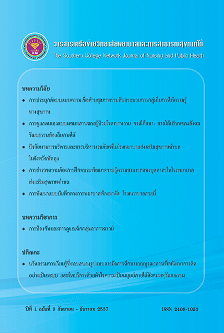การประยุกต์แบบแผนความเชื่อด้านสุขภาพร่วมกับกระบวนการกลุ่มในการให้ความรู้ทางสุขภาพ
คำสำคัญ:
โปรแกรมสุขศึกษา, พฤติกรรมการเลือกซื้อ, การบริโภคผลิตภัณฑ์อาหาร, กระบวนการกลุ่ม, แบบแผนความเชื่อด้านสุขภาพ, Health Belief Model, Group Process, Healthy Purchasing Behaviors, Food Product Consumption, Health Education Programบทคัดย่อ
การวิจัยแบบกึ่งทดลองครั้งนี้ มีวัตถุประสงค์เพื่อศึกษาประสิทธิผลของโปรแกรมสุขศึกษาโดยการประยุกต์แบบแผนความเชื่อด้านสุขภาพร่วมกับกระบวนการกลุ่ม เพื่อส่งเสริมพฤติกรรมการเลือกซื้อและบริโภคผลิตภัณฑ์อาหารของแม่บ้านอำเภอศรีนครินทร์ จังหวัดพัทลุง กลุ่มตัวอย่างคือแม่บ้านจำนวน 150 คน เป็นกลุ่มทดลอง 75 คน และกลุ่มควบคุม 75 คน กลุ่มทดลองได้เข้าร่วมกิจกรรมตามโปรแกรมสุขศึกษาใช้เวลา 12 สัปดาห์ กลุ่มควบคุมไม่เข้าร่วมในกิจกรรมดังกล่าว ดำเนินการเก็บข้อมูลโดยใช้แบบสอบถาม และวิเคราะห์ข้อมูลหาค่าสถิติด้วย ร้อยละ ค่าเฉลี่ย ส่วนเบี่ยงเบนมาตรฐาน PairedSample t-test และ t-test โดยกำหนดระดับความเชื่อมั่นที่ 95 %
ผลการวิจัย พบว่า กลุ่มทดลองมีการเปลี่ยนแปลงด้านความรู้เกี่ยวกับผลิตภัณฑ์อาหาร การรับรู้โอกาสเสี่ยงต่อโรคที่เกิดจากการเลือกซื้อและบริโภคผลิตภัณฑ์อาหารที่ไม่ได้มาตรฐาน การรับรู้ความรุนแรงของโรคในการเลือกซื้อและบริโภคผลิตภัณฑ์อาหารที่ไม่ได้มาตรฐาน การรับรู้ต่อผลดีของการปฏิบัติตามคำแนะนำ และพฤติกรรมในการเลือกซื้อและบริโภคผลิตภัณฑ์อาหารที่ได้มาตรฐาน ที่ถูกต้องมากกว่าก่อนทดลอง และมากกว่ากลุ่มควบคุม อย่างมีนัยสำคัญทางสถิติ
ข้อเสนอแนะ ควรนำโปรแกรมนี้ไปประยุกต์ใช้กับกลุ่มตัวอย่างอื่นในพื้นที่อื่น หรือนำไปใช้กับพฤติกรรมการปฏิบัติตัวในด้านอื่นและกลุ่มเป้าหมายอื่น แล้วนำผลการวิจัยมาเปรียบเทียบซึ่งกันและกันเพื่อจะนำไปสู่การพัฒนางานวิจัยในโอกาสต่อไป
The Application of the Health Belief Model with Group Process in Health Education Program
This quasi-experimental study aimed to determine the effectiveness of a health educational program developed by the researcher that applied the Health Belief Model and Group Process in order to promote healthy purchasing behaviors and food product consumption among housewives in the Srinakarin District of Phatthalung Province, Thailand. The sample was 150 housewives. It was divided into the experimental group and the control group (75 people each group). The experimental group received the 12–week the health educational program. A questionnaire was employed for data collection before and after intervention. Statistics used for data analysis included frequency, percentage, means, standard deviation, paired sample t-test and independent sample t-test.
The results of this study revealed that after the experiment, the mean score of 1) knowledge regarding food products, 2) perceived susceptibility and perceived severity of diseases caused by food consumption, 3) perceived benefit of compliance to the recommendation regarding healthy purchasing behavior and food consumption, and 4) behavior of healthy purchasing and food consumption was statistically significant higher than before the experiment.
The study suggested that this program should be implemented in other group of people in different areas. And the program should be applied in other kinds of behaviors, and make a cross-check over results for further program development.
ดาวน์โหลด
เผยแพร่แล้ว
ฉบับ
ประเภทบทความ
สัญญาอนุญาต
1. บทความหรือข้อคิดเห็นใด ๆ ที่ปรากฏในวารสารเครือข่าย วิทยาลัยพยาบาลและการสาธารณสุขภาคใต้ ที่เป็นวรรณกรรมของผู้เขียน บรรณาธิการหรือเครือข่ายวิทยาลัยพยาบาลและวิทยาลัยการสาธารณสุขภาคใต้ ไม่จำเป็นต้องเห็นด้วย
2. บทความที่ได้รับการตีพิมพ์ถือเป็นลิขสิทธิ์ของ วารสารเครือข่ายวิทยาลัยพยาบาลและการสาธารณสุขภาคใต้








